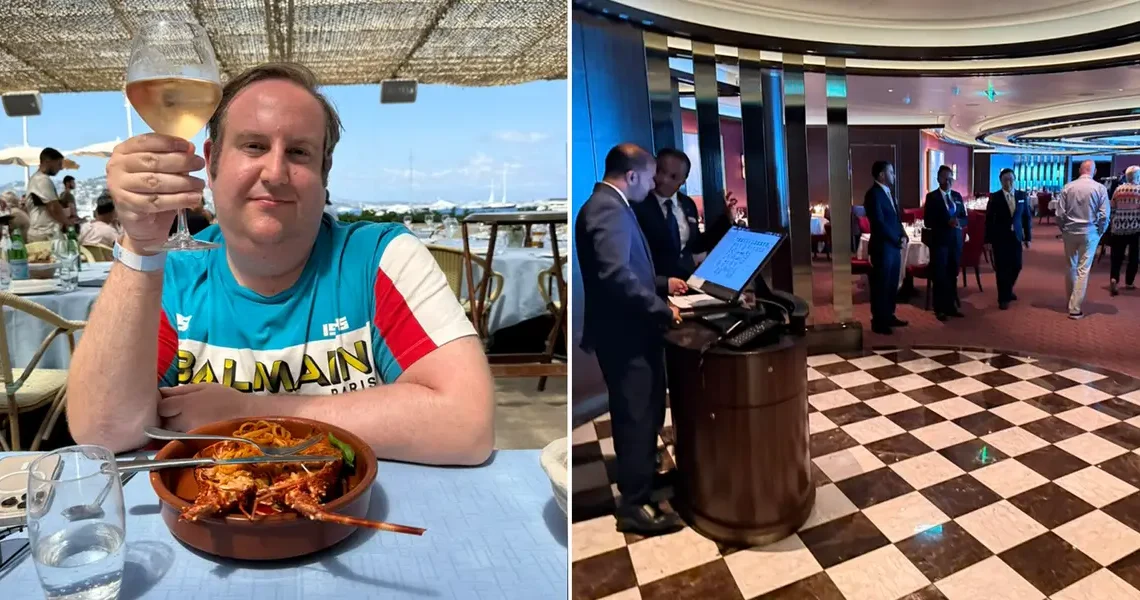My mom and I had always wanted to visit the Spanish and French Riviera. But with some top hotels charging over $3,000 a night during peak season, I knew it could be a pricey proposition.
Since we hoped to visit several coastal cities, I started looking into ultra-luxury cruises and found a sailing on Silversea’s Silver Ray that seemed too good to pass up.
What drew me in was the itinerary, plus Silversea’s much-hyped S.A.L.T. (Sea and Land Taste) program, which includes special onboard menus, talks, and onshore culinary experiences.
Prices vary, but our entry-level suite cost about $7,050 a person for the eight-night sailing from Barcelona to Monte Carlo in July.
That fare included so much: dining, unlimited caviar, premium beverages, gratuities, and our own butler. The only real extra costs were for a few specialty restaurants, spa treatments, and premium excursions.
Here’s what our trip was like.
Checking in was easy.
To mitigate the risk of travel delays on embarkation day, we flew into Barcelona a day early. The next morning, we headed to our ship.
Silver Ray, which is about 800 feet long, accommodates only 728 guests. With a smaller group and staggered arrival times, we were checked in within a few minutes.
Once on board, we were greeted with champagne and caviar, then told our cabin would be ready by 2 p.m.
As I’d expected, one of the best parts of the Silver Ray was the food and many meal options.
Silver Ray features several distinct restaurants, ranging from classic French fine dining and sushi to barbecue and regional Mediterranean fare.
Some spaces even shift identities throughout the day — casual at lunch, more refined by night.
The best example is probably The Marquee, the ship’s open-air dining hub with great sea views that runs from breakfast through late-night cocktails. It quickly became one of our favorite spots on the ship.
By day, it’s Spaccanapoli, a breezy pizzeria serving thin-crust pies under the sun. By evening, it becomes The Grill, a laid-back steakhouse where guests can sear their own protein on a hot stone.
Three venues charge extra for dining, although one offers an included lunch option.
Three onboard restaurants —S.A.L.T. Chef’s Table, Kaiseki, and La Dame — cost extra for dinner and require reservations.
However, Kaiseki, which serves sushi and other raw Asian-inspired dishes, is complimentary at lunch with a shorter menu.
We loved going there for a light lunch of nigiri. The small, minimalist dining room felt calm and polished, with counter seating that allowed us to watch the chefs at work.
At night, the space offered a more elaborate Japanese tasting menu for $80 per person, which included sake or tea pairings.
In terms of other added-charge restaurants, there was also La Dame.
La Dame felt like the most formal restaurant on board, serving French fine dining with a modern touch. Think: rich sauces, precise plating, and service that felt almost choreographed.
Dinner there costs $100 a person. When we tried it, my mom particularly loved her Dover sole, which was deboned tableside.
We also paid extra to try S.A.L.T. Chef’s Table, which was essentially an avant-garde chef’s counter.
The focus at S.A.L.T. Chef’s Table was on regional cuisine presented directly from stove to plate.
The $180-a-person experience was one of the ship’s few premium offerings, and we felt it was worth it for a fun and interactive evening.
Each night featured a single seating with a multicourse tasting menu paired with wines and cocktails. It felt less like a formal restaurant and more like a small dinner party where everyone shared in the show.
This is different from The S.A.L.T. Kitchen, an included dinner spot that changed its menu daily to highlight whatever region we were visiting.
We also enjoyed Atlantide.
Both The S.A.L.T. Kitchen and Atlantide felt elegant but not stuffy, with soft lighting, large windows, and service that struck the right balance between formal and friendly.
The Atlantide menu leaned toward seafood and steakhouse favorites, from caviar and scallops to beautifully rich lobster thermidor (lobster cooked in a creamy wine sauce), which became one of our go-to dishes on board.
La Terrazza was also a popular spot for us.
We actually had our first onboard meal at La Terraza, a relaxed indoor-outdoor spot where breakfast and lunch are largely buffet-style, but servers are also quick to bring eggs or pasta from the kitchen.
At night, it turns into a proper Italian trattoria, where guests can dine inside or outside. We loved that the sommelier would open a bottle and leave it at the table so we could keep our glasses full.
Silver Note was also a hit for more formal meals.
The ship’s Silver Note felt like a throwback to old-school supper clubs, with live jazz, dim lighting, and yacht-like polish. The menu focused on elevated share plates, featuring refined tapas-style dishes designed to be mixed and matched.
We had a fun night dining here and appreciated how the staff encouraged us to try a little bit of everything.
For a quick coffee or light bite, Arts Café was a favorite.
Silver Ray’s Arts Café served smoothies, teatime staples, espresso, and snacks throughout the day.
We could even order bites from here to our suite, as room service was available 24/7.
There were quite a few bars on board, too.
Our favorite was S.A.L.T. Bar, a craft mixology bar that felt almost like a private club in atmosphere.
The bartenders here were some of the best on board, blending local ingredients to create regionally inspired riffs on classics.
We also enjoyed stopping by The Shelter and Dusk Bar.
The Shelter, a champagne-focused spot that featured a violinist in the evenings, spanned three stories.
I really loved The Dusk Bar, located outdoors on the stern of the ship. Most nights, my mom and I would grab a post-dinner cocktail here and watch the sunset fade into the sea.
Some evenings, we caught a show inside the Venetian Lounge.
The Venetian Lounge featured cabaret-style seating with small tables, as well as a few boxes on the side.
When we went, it was usually for one of the revue-style performances with singers and dancers.
During the day, this space was used to host cooking demos, wine tastings, and destination talks. We attended a session on paella making and also tried an intimate wine tasting here.
The ship also featured a casino and a large pool.
The casino felt small but lively, with a few tables for blackjack, roulette, and poker, plus a handful of slot machines.
We also appreciated the ship’s massive pool, surrounded by ample seating and truly incredible views of the sea.
The onboard boutique felt well-curated.
The ship’s duty-free boutique featured sleek displays and a mix of designer fashion, jewelry, and beauty products.
Handbags from Louis Vuitton and Chanel were available, along with fragrances and skincare products from brands like Sisley and La Mer.
It felt more like a well-curated edit than a typical duty-free shop.
I was also impressed by the massive wellness complex.
The wellness area combined a full spa and fitness center, both of which were larger than I expected for a ship of this size.
The Otium Spa had treatment rooms, a sauna, and a steam area that guests could use without an extra fee, though massages and facials came at an added cost.
I booked a couple of massages here that were excellent.
The gym next door had Technogym equipment, free weights, and daily classes, all with views over the water. It offered a variety of fitness classes throughout the day, like yoga, Pilates, and HIIT.
However, the space I loved most was our suite.
We booked the most affordable suite available on our sailing. Fortunately, it didn’t feel cheap at all.
Our entry-level veranda suite felt spacious with a queen-size bed, a small living area with a couch, and a desk. The suite had tons of storage, including a large walk-in closet with a chest of drawers and plenty of space for hanging clothes.
These rooms are typically about 350 square feet with a veranda just under 55 square feet.
All rooms get serviced by a room attendant and a butler.
Our attendant kept everything spotless, and our butler ensured that our clothes were pressed, our shoes were shined, and that we always had champagne on ice and caviar waiting for us after excursions.
Best of all, our butler even helped us with packing and unpacking.
The bathroom featured the biggest shower we’ve ever had on a cruise ship.
It was stocked with Otium products, although our butler offered to switch them out for ones from the high-end brand Bvlgari if we preferred.
As beautiful as the ship was, we loved our time ashore.
Though we arranged a few activities on our own, we booked most of our excursions through the ship.
Most were part of the aforementioned S.A.L.T. program, which focuses on food and culture in each destination.
The S.A.L.T. excursions were especially great.
My mom especially enjoyed our S.A.L.T. excursions, particularly a visit to a sheep farm in Palamós, Spain, where we made fresh cheese.
We also joined a S.A.L.T. excursion in Palma de Mallorca for a wine-tasting and cooking class that concluded with a relaxing meal under the olive trees.
Later, in Provence, we spent the day with a Michelin-starred chef at his family’s farmhouse, cooking lunch together with produce from the garden.
However, my favorite experience came at the end of our cruise.
Our ship arrived in Cannes on Bastille Day.
My mom and I had managed to independently score a reservation at La Guérite, a legendary beach club and restaurant on Île Sainte-Marguerite, which is reachable only by boat.
For me, La Guérite defines the Riviera summer — open-air tables set right on the sand, a DJ spinning all afternoon, and bottles of rosé that never seem to stop appearing.
The food was fantastic, with grilled fish, truffle pasta, and big family-style platters, but the energy was the real draw. Lunch turned into a full-blown party, with guests dancing between tables and champagne showers breaking out by dessert.
Upon returning to the ship, we were greeted with fireworks.
The fireworks weren’t organized by the cruise line but were part of the Bastille Day celebrations taking place across France.
In Cannes, the show happens over the bay, with barges launching fireworks synchronized to music that echoes off the waterfront.
From The Dusk Bar, we had a front-row view as the entire sky lit up in every direction.
After an incredible final day, we disembarked in Monaco the next morning.
Ultimately, I’d say the cruise felt like a great value.
Looking back, the cruise absolutely felt worth the cost.
It was significantly less expensive than what we’d have paid to stay in top hotels along the Riviera during high season and book independent travel from place to place. Plus, the cruise allowed us to experience the region in the best possible way: by sea.
Though we added some extra spa treatments and premium excursions to our total, the value of the included meals, service, and amenities we experienced felt undeniable.
I’d sail with Silversea again in a heartbeat, perhaps somewhere entirely different next time, such as the fjords, the South Pacific, or even Antarctica, where guests can fly directly to King George Island to skip the infamous Drake Passage altogether.
Read the original article on Business Insider
The post We paid over $14,000 for the cheapest room on an ultra-luxury cruise. Take a look inside our ship and 350-square-foot suite. appeared first on Business Insider.




